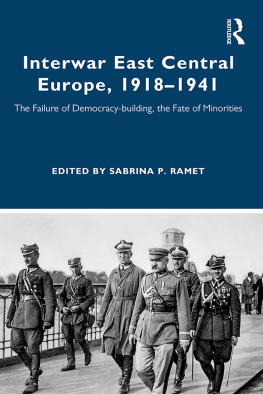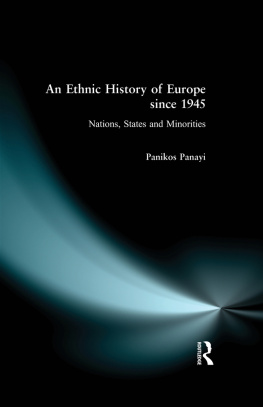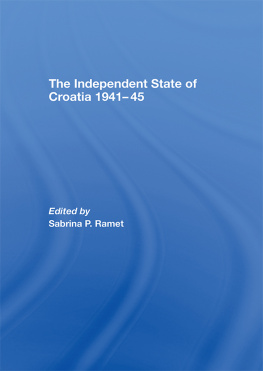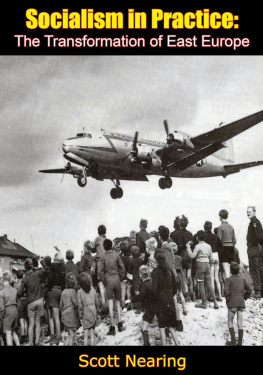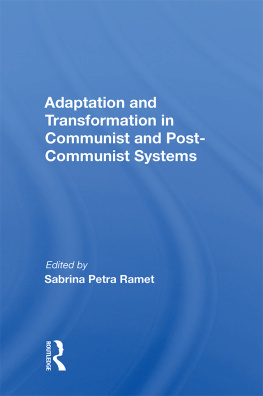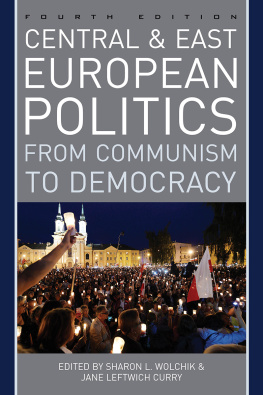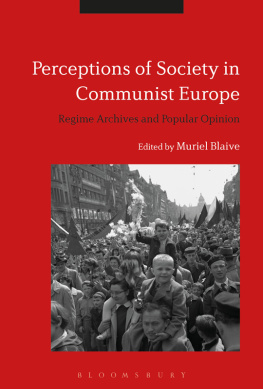Interwar East Central Europe, 19181941
This monograph focuses on the challenges that interwar regimes faced and how they coped with them in the aftermath of World War One, focusing especially on the failure to establish and stabilize democratic regimes, as well as on the fate of ethnic and religious minorities. Topics explored include the political systems and how they changed during the two decades under review, land reform, Churchstate relations, and culture. Countries studied include Poland, Czechoslovakia, Hungary, Yugoslavia, Romania, Bulgaria, and Albania.
Sabrina P. Ramet is Professor Emerita of Political Science at the Norwegian University of Science and Technology (NTNU), in Trondheim, Norway.
ROUTLEDGE STUDIES IN MODERN EUROPEAN HISTORY
73 Interwar East Central Europe, 19181941
The Failure of Democracy-building, the Fate of Minorities
Edited by Sabrina P. Ramet
74 Free Trade and Social Welfare in Europe
Explorations in the Long 20th Century
Edited by Lucia Coppolaro and Lorenzo Mechi
75 Immigrants and Foreigners in Central and Eastern Europe during the Twentieth Century
Edited by Wodzimierz Borodziej and Joachim von Puttkamer
76 Europe between Migrations, Decolonization and Integration (19451992)
Edited by Giuliana Laschi, Valeria Deplano, Alessandro Pes
77 Steamship Nationalism
Ocean Liners and National Identity in Imperial Germany and the AtlanticWorld
Mark Russell
78 Transatlantic Anarchism during the Spanish Civil War and Revolution, 19361939
Morris Brodie
For more information about this series, please visit: https://www.routledge.com/history/series/SE0246
First published 2020
by Routledge
2 Park Square, Milton Park, Abingdon, Oxon OX14 4RN
and by Routledge
52 Vanderbilt Avenue, New York, NY 10017
Routledge is an imprint of the Taylor & Francis Group, an informa business
2020 selection and editorial matter, Sabrina P. Ramet; individual chapters, the contributors
The right of Sabrina P. Ramet to be identified as the author of the editorial material, and of the authors for their individual chapters, has been asserted in accordance with sections 77 and 78 of the Copyright, Designs and Patents Act 1988.
All rights reserved. No part of this book may be reprinted or reproduced or utilized in any form or by any electronic, mechanical, or other means, now known or hereafter invented, including photocopying and recording, or in any information storage or retrieval system, without permission in writing from the publishers.
Trademark notice: Product or corporate names may be trademarks or registered trademarks, and are used only for identification and explanation without intent to infringe.
British Library Cataloguing-in-Publication Data
A catalogue record for this book is available from the British Library
Library of Congress Cataloging-in-Publication Data
A catalog record has been requested for this book
ISBN: 978-0-367-13570-6 (hbk)
ISBN: 978-0-367-13571-3 (pbk)
ISBN: 978-0-429-02722-2 (ebk)
Cover image: Marshal Pisudski entering Warsaw on 12 May 1926 at the start of his coup Alamy Stock Photo
For Frank Cibulka
Stefano Bianchini is Professor of East European Politics and History at the University of Bologna, Forli campus, Italy, and director of the Istituto per lEuropa Centro-Orientale e Balcanica. He is author, inter alia, of Eastern Europe and the Challenges of Modernity, 18002000 (Routledge, 2015) and Liquid Nationalism and State Partitions in Europe (Edward Elgar, 2017). He is editor or co-editor of 23 books, among them Self-Determination and Sovereignty in Europe: From Historical Legacies to the EU External Role (Longo editore, 2013), and executive editor of the Brill journal, Southeastern Europe.
Robert Bideleux is Reader in Politics and Political Economy at Swansea University, UK, where he has been program director of the PPE degree since its inception in 2009. Born in Argentina, he was educated in Brazil and the UK. Publications include Communism and Development (Methuen 1985; 2nd edition, Routledge 2014); European Integration and Disintegration: East and West (Routledge, 1996, co-edited); A History of Eastern Europe (Routledge, 1998, 2nd edition, 2007, with Ian Jeffries); The Balkans: A Post-Communist History (Routledge 2007, with Ian Jeffries); and chapters on Marxism in The Sage Handbook of Political Sociology (2018). He is currently writing books on genocide and on the rise of non-Western economic thought.
M. B. B. Biskupski received his doctorate from Yale University, Connecticut. He holds the Blejwas Endowed Chair in Polish History at Central Connecticut State University and previously taught at Yale University and the University of Rochester, New York. He has held fellowships at the Central European University in Budapest, Hungary, and the University of Warsaw, Poland. He was appointed to the Honour Roll of Polish Scholarship by Polands ministry of education, and elected to the Societ polonaise des Sciences et des Lettres ltranger, London. He was awarded the Krzy Komandorski Orderu Zasugi of the Republic of Poland. He has published 18 books, 60 articles, and many smaller works. He has been the president of the Polish Institute of Arts and Sciences, and the Polish American Historical Association, New York, as well as being a director of the Jzef Pisudski Institute, New Britain, Connecticut.
Bla Bod is Professor of History at the University of Bonn, Germany. He is the author of Tiszazug: The Social History of a Murder Epidemic (East European Monographs/Columbia University Press, 2002) and Pl Prnay: Paramilitary Violence and Anti-Semitism in Hungary, 19191922 (Pittsburgh University Press, Carl Beck Papers, October 2010). He is currently writing a book on contract with the University of Rochester Press, entitled Red Terror/White Terror: Paramilitary and Mob Violence in Hungary, 19161923.
Roland Clark is Senior Lecturer in Modern European History at the University of Liverpool, UK. He is the author of Nationalism, Ethnotheology and Mysticism in Interwar Romania (The Carl Beck Papers in Russian and East European Studies, 2009) and Holy Legionary Youth: Fascist Activism in Interwar Romania (Cornell University Press, 2015), as well as articles published in various journals.
Bernd J. Fischer is Professor Emeritus of History at Indiana University/Purdue University, Indiana. He is the author of King Zog and the Struggle for Stability in Albania (East European Monographs/Columbia University Press, 1984) and Albania at War, 19391945 (Purdue University Press, 1999), and editor, among other works, of Balkan Strongmen: Dictators and Authoritarian Rulers of South Eastern Europe (C. Hurst & Co., 2007). He is currently writing A Concise History of Albania, on contract with Cambridge University Press.
Stipica Grgi (born 1982) is Assistant Professor at the Department of History, at the University of Zagrebs Department for Croatian Studies, Croatia. He received his Ph.D. degree in modern history from the University of Zagreb in 2014. He has published several papers on topics such as the role of symbolism in construction of Croatian and Yugoslav nationalism and the formation of borders during the twentieth century and is currently interested in exploring topics connected to the social and everyday history of Croatia, neighboring countries, and other European states in the first four decades of the twentieth century.

